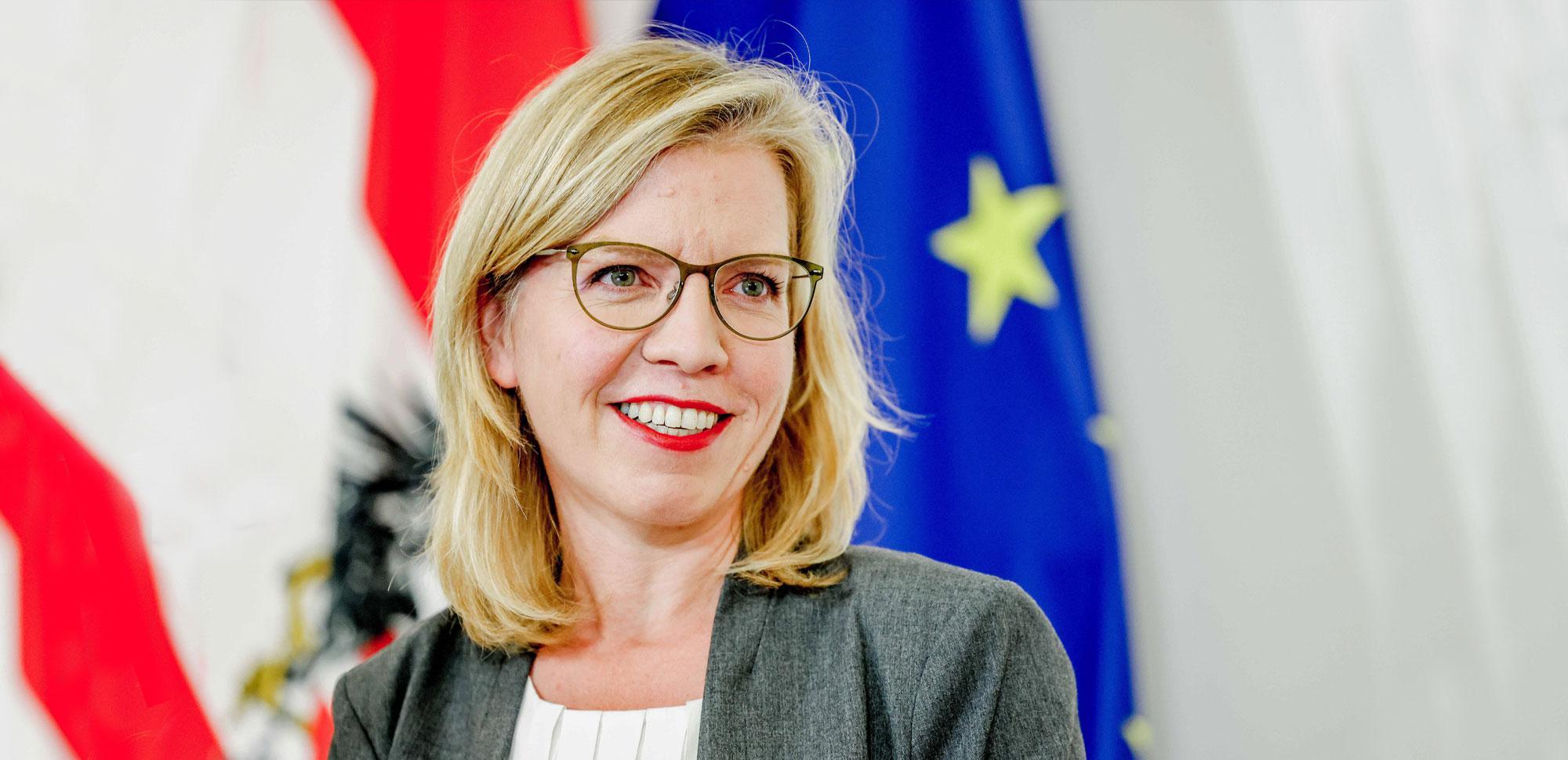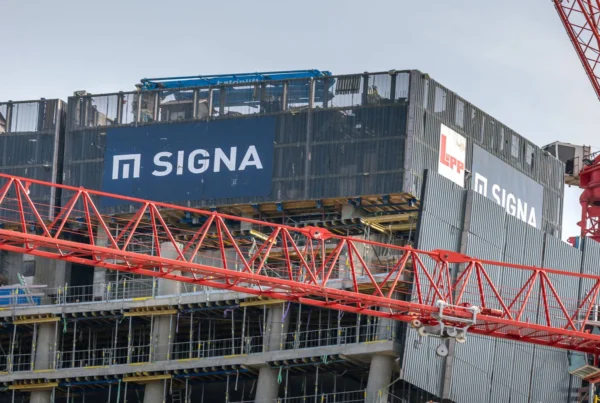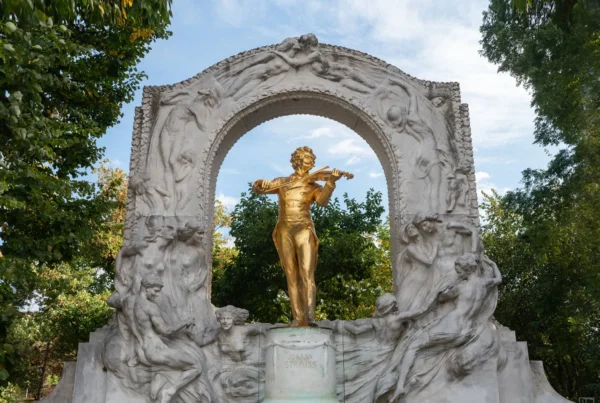Leonore Gewessler, Austria’s Federal Minister for Climate Action and Environment has been in the news of late. Her decision to stop a number of high-profile highway projects has opposition parties and its coalition partner in the Austrian government up in arms. iGlobenews discussed these projects, EU climate policy and transportation policy, COP26, Austria’s Climate Act and her position on nuclear energy.
By Diana Mautner Markhof 9.12.2021
Minister Gewessler is authentic and knowledgeable in her area of responsibility – having been a successful environmental activist before joining politics. On 1 December 2021 she announced a stop to building the autobahn tunnel underneath the Lobau National Park, the northern bypass or gap closure of highway S1, as well as to a number of other highway projects in Vienna and Lower Austria. “More roads mean more cars. More roads lead to more traffic.” She does not see herself as an activist. Her controversial decisions were the necessary answer to “runaway climate change”. Traffic is the “problem child” in the climate balance sheet of Austria, one of only six countries in the EU which has not managed to lower emissions in the last 30 years. Building yet another road to alleviate traffic will, in her opinion, only lead to more congestion.
This decision to re-evaluate all the road-building projects of the ASFINAG, which is the corporation responsible for planning, building and maintaining the Austrian autobahns, has been making headlines in Austria for the past week and has been strongly criticized by Vienna’s Mayor Ludwig, the Governor of Lower Austria Mikl-Leitner and many experts, who also fault the Minister for not proposing any alternative solution.
Despite the mounting pressure, Minister Gewessler is sticking to her decision. Being Austria’s First Climate Action Minister means taking bold and necessary decisions to mitigate the global climate crisis which in her own words is “the major challenge of our times.” The re-evaluation of the road-building projects prepared by her Ministry, the ASFINAG and the Environmental Research Institute (Umweltbundesamt) took into account traditional indicators as well as new ‘environmental’ indicators such as land use, climate change and bio-diversity.
According to official statistics of the City of Vienna and Statistics Austria, one-fifth of Vienna’s population currently live in the newer districts of the city. Despite Vienna’s commendable spending on public transportation, which is three times as high as on road building, experts have said that in the foreseeable future expanding public transportation cannot fill the gap created by stopping the Lobau Tunnel. Fast population growth poses a major challenge for transportation policy. Minister Gewessler understands these concerns, especially since the districts across the Danube are the fastest growing areas in Vienna. That is why she supports public transport infrastructure projects in districts such as Donaustadt and Floridsdorf.
Mayor Ludwig of Vienna from the Social Democratic Party has come out in support of a referendum on the question of the Lobau Tunnel, stating “I assume that projects decided by law will also be implemented.” He believes that a majority of Viennese will support the Lobau Tunnel. When asked to comment on whether she would accept the result of the referendum, Minister Gewessler reiterated that the arguments of the city of Vienna had been heard.
Minister Gewessler’s goal of protecting the unique fauna and flora of the National Park Lobau is commendable. Future generations will likely praise her political ‘activism’ and courage. In the short-run, for those citizens who sit in traffic jams every day on their way to work and into the city – joy will give way to frustration and resentment. In that sense, one cannot envy the difficult political position she has maneuvered herself into by taking this ‘bold’ decision.
When asked how she judges the results of the recently concluded COP26 Summit in Glasgow, on average her optimism outweighs the disappointment at what the Summit did not achieve. The fact that the whole world will focus on climate change for two weeks each year because of the COP is a success in and of itself. Industry, production, traffic and waste management, construction and agriculture all have their parts to play in reaching net zero emissions by 2040 in Austria and 2050 in the EU. Ultimately, it is up to each nation to implement the goals and, according to Minister Gewessler, the bar has been raised for everyone – and that is a good.
Trucks, buses and motorcoaches are responsible for about a quarter of road transport CO2 emissions in the EU and for some 6% of total EU emissions. Despite some improvements in fuel consumption efficiency in recent years, these emissions are still rising, mainly due to increasing road freight traffic. For Austria, which sits in the heart of Europe, this issue is very important. “Moving freight transport to rail is one of the key pillars of a … mobility system” for the future. To realize EU and Austrian climate goals, investment into public transport and bicycle lanes is insufficient.
According to the Minister, you need to move more freight onto the rails. And, since goods are crossing borders, this needs to be a European initiative. Austria is investing EUR 150 million into this project, but action and legislation on the EU level is required. According to Minister Gewessler, it is all about a “level and fair playing field” between freight on trains and on trucks. She supports the new Eurovignette Directive adopted by the European Council in early November which will reflect a new pricing structure linked to CO2 intensity.
Nuclear remains a red flag for the Green Minister, despite the fact that Austria likely imports up to 25 percent of its electricity from nuclear origin. According to the Minister, by 2030 all of Austria’s electricity will be generated by water, wind, photovoltaics and biomass. Austria is investing one billion euros per year to reach this goal. According to the International Atomic Energy Agency, Small Modular Reactors also known as SMRs will offer lower initial capital investment, greater scalability and siting flexibility for locations unable to accommodate more traditional larger reactors and are notably cheaper and safer. When asked whether she would consider a re-evaluation of her stance on nuclear when SMRs become available, her answer was clearly no. The disasters of Three Mile Island, Chernobyl and Fukushima loom large – as they should. Yet shutting oneself off to science and technological innovation is not to be recommended – regardless of the strong convictions one holds.
Since the beginning of this year, Austria has lacked a legal basis for its climate policy goals. The official government goal is climate neutrality by 2040 and Minister Gewessler is preparing a new Climate Act which will bring together the green goals for this government. Minister Gewessler is very open and supportive of science when it comes to the environment and climate. Her new Climate Act will bring scientists as well as civil groups together in a citizen’s climate council which will provide input into the policy decision-making process for achieving effective climate policies.





